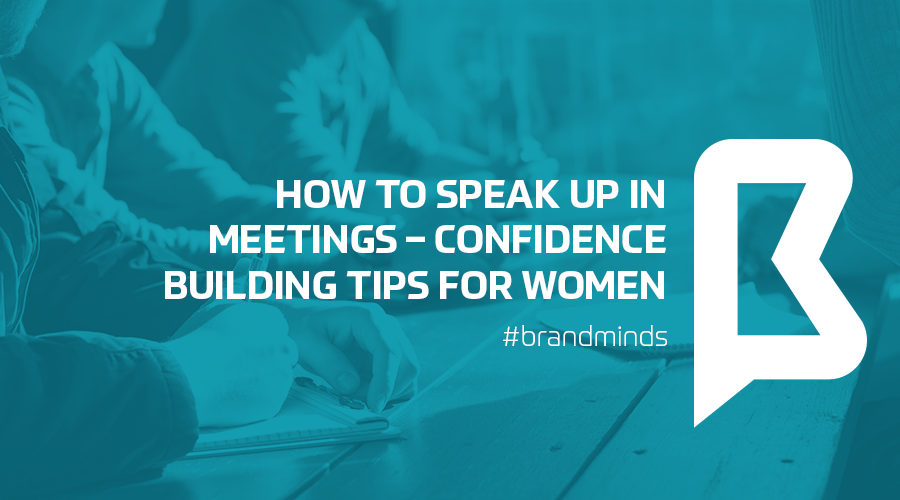Most women feel uncomfortable speaking up in office meetings.
This article points out the most common reasons why women keep silent at work, details the numerous abilities that women are born with and gives you 3 tips to help you begin speaking up in office meetings.

Angela’s Story
Angela is a twenty-something graphic designer just three months into her new job. She’s very quiet in meetings, thinking she’s new and she shouldn’t speak up. Dozens of comments, questions and ideas on various subjects run around in her head, but she refuses to speak them in meetings. She keeps silent because she doesn’t want to rock the boat.
Then a new guy joins the team. In the very first meeting, he voices the same questions and comments that she’s also thought of. He’s not holding back and he’s not afraid. The management is impressed by his ideas and critical thinking. They pat him on the back and tell everyone This is exactly why we hired you! Angela is frustrated and angry with herself: That should have been me! Why didn’t I speak up?!
Do you identify with Angela’s story?
If you do, keep reading.
Women hold themselves back
Talking to women who work in business environments we found they tell themselves any or all of the following:
- They assume their ideas are not new or worthy of being brought up;
- They don’t want to rock the boat and challenge the state of things;
- Are afraid of being perceived as aggressive;
- Assume they are not competent enough;
- Are afraid of looking foolish;
- They confuse critical thinking with being aggressive.
Women are simply better than they think they are
Ute Ehrhardt, the author of Good Girls Go to Heaven, Bad Girls go Everywhere says men are raised to be competitive. They learn to decide for themselves from early childhood even when they have very little information.
Inside the 348 pages of her book, Ute works hard to support her acknowledgement that women are just better than men. She backs up her belief with scientific arguments: studies and bodies of research, latest discoveries in neurobiology, questionnaires etc.
Here is a list of women’s innate abilities which Ute talks about in her book:
- High level of empathy;
- Better communication skills;
- Higher ability to negotiate;
- Increased sensory perception;
- Distributive attention;
- Higher ability to sustain physical stress;
- Leadership qualities that rely on collaboration, fairness, correct use of team members’ competences;
- Organisational skills;
- Women’s thinking patterns are based on a network-model instead of the linear-model thinking of men;
- Women find unexpected solutions to a problem by looking at it from different angles;
- Women’s brains are capable of assimilate and process increased amounts of data and information with little effort;
- Women’s intuition works faster and more reliable than their minds.
Women sabotage themselves because they lack self-confidence
The only reason women don’t speak up in meetings at work is because they are not as confident as their male colleagues.
As little girls, they have been raised to behave, speak politely and only talk when asked a question. As grown-ups, women help and support the others, wanting to please and assist them in reaching their goals or potential.
Ute says:
„the female urge to help is too strong. We don’t separate others’ wishes from our drive to satisfy them – although there is no connection between the two.”
[bctt tweet=”Discover 3 tips to build your confidence if you want to speak up in meetings” username=”brand_minds”]
How to build your confidence – 3 tips
You can build your self-confidence if you start acknowledging the natural abilities that nature has bestowed upon you and start using them to your benefit.
Do you want to build your confidence?
This is what you need to do.
- Acknowledge that you are the expert on your subject or niche, no one else knows more than you do;
- Always remember that your professional background and experience entitles you to speak up and be heard;
- Set up goals of speaking up for 1 minute at every meeting.
Here are three simple ways to help you speak up in meetings:
1. Start by asking questions
Asking questions invites discussion, it opens up the door for brainstorming and it is a way to present yourself as an analytical and logical person.
2. The Yes, ….plus/furthermore…..method
Start by acknowledging what the previous speaker said, then tell your idea like so:
Yes, it’s a great proposal, plus we can also do it this way…
Your idea is great, moreover here’s another approach I’m thinking of right now…
Yes, we can do it this way, furthermore we can also put it this way: ….
Notice the structure of the phrase: you give a positive feedback, followed by moreover/furthermore and your input. Maybe your colleagues won’t like or accept your suggestion, but you would have given it in a nonconflicting manner.
3. Follow your intuition, but back it up with data
Intuition is a very powerful quality. Don’t ignore it! Go with your intuition and ask for answers when something feels wrong or sounds fake. Be persistent and don’t give up unless you get to the bottom of things.
But you cannot present your intuition as your main argument for business suggestions or operations improvements unless it comes with a valid explanation as well. Imagine the looks on your colleagues’ faces if you say I just have a feeling it would be better this way… Check what your intuition tells you with facts and figures, reports, whitepapers etc.
Conclusion
Women are as competent as men. You have earned the right to speak up and be heard. What holds you back is no one but yourself.
Be self-aware of your accomplishments and experience. Remember that your perspective is unique and your input is original. Take steps towards building your confidence every day.


















